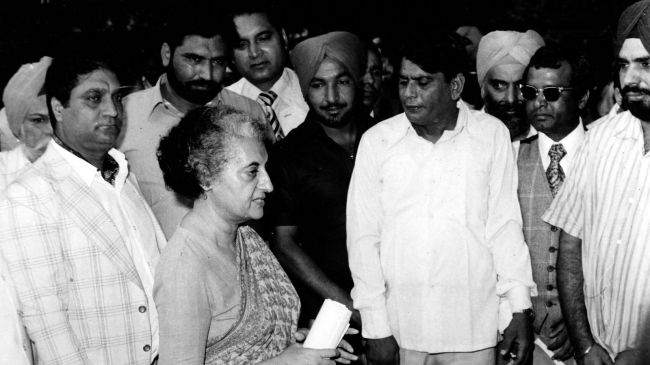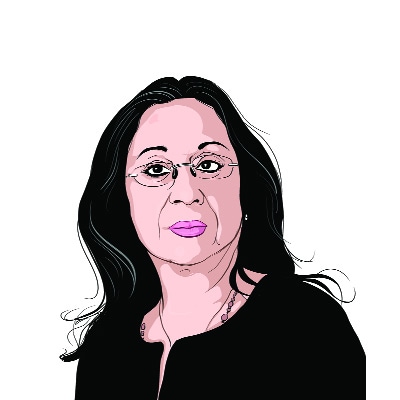Opinion Tavleen Singh writes: On the 50th anniversary of Emergency, need to think what should be done to protect our democracy
So, on this 50th anniversary of that day that led to India becoming a dictatorship for a while, we need to think seriously about what we should all be doing to protect our democracy. It is a fragile thing, democracy, and can easily be crushed unless people, ordinary people, stand up for their rights.
 Some of the members of Indian Community in London who participated in the Massive demonstration in support of Prime Minister Indira Gandhi emergency measures (Express archive)
Some of the members of Indian Community in London who participated in the Massive demonstration in support of Prime Minister Indira Gandhi emergency measures (Express archive) Next week will be the 50th anniversary of the Emergency. For me, it is a particularly important anniversary because had I not been an impressionable junior reporter in that time 50 years ago, I may not have chosen political journalism as a career. It was because I saw how overnight India moved from being a noisy, chaotic democracy to a dictatorship. Noisy and chaotic are the words Zulfikar Ali Bhutto used for India’s democracy during the show trial that led to his execution by a military dictator.
They are good words to describe what Delhi was like in the days before that midnight when Indira Gandhi declared the Emergency. Overnight, every major Opposition leader was thrown into jail and in Delhi, policemen could be seen under almost every other tree. And they were so determined to crush all dissent that in Connaught Place a wandering street performer was arrested because a policeman heard Indira Gandhi’s name mentioned while he tried to get his monkey to obey him. Overnight, at restaurants and coffee shops where people like us met for noisy discussions, signs appeared warning people that it was forbidden to talk about politics.
As a reporter who had until then paid more attention to human rights issues than politics, I learned very quickly that politics, in half-made countries like ours, was more important than anything else. So important that it permeated every aspect of our lives. I also learned that democracy was what held India together and that ordinary, illiterate people understood its importance better than those who spent their evenings gossiping about politics in Delhi’s drawing rooms. Ordinary people understood better because it was they who were forcibly sterilised and they whose homes were flattened by bulldozers in the name of beautifying Delhi.
The important question is whether that brutal repression of democratic rights can happen again, and the answer is that it can, but in a more dangerously subtle way. There are those who say that since Narendra Modi became prime minister, an ‘undeclared emergency’ has come into force. I hesitate to make sweeping judgements of that kind, but what has happened is that some freedoms we took for granted have become endangered. This has been done not by throwing Opposition leaders, journalists and dissidents into jail, but by tweaking the laws to make curbs on freedom legally possible.
The law that is supposed to prevent sedition has been tweaked to widen the definition of that word. Laws meant to curb black money have been tweaked as well and if a dissident does not end up in jail for ‘anti-national activities’, he could end up rotting in some forgotten cell because the Enforcement Directorate charges him with money laundering. The Opposition leaders who have these charges thrown at them have fought back valiantly because they have political parties behind them, but dissidents and journalists have just learned to keep quiet. Is that good? Is that democracy?
After Donald Trump became president, there are many Indians who have gleefully taken to declaring that if Trump can impose curbs on freedom, then why should Indian leaders not do the same? Having just returned from New York, where I go to see my son, who has been denied an ordinary visa to come to India because of an article he wrote, may I say that there is huge pushback against what Trump is doing. While I was there, he held a military parade in Washington to show off American weapons in the way that tinpot dictators do. And on the day of the parade, hundreds of thousands of Americans took to the streets in ‘noKings’ rallies. I witnessed one of these rallies in a small town in upstate New York and was astonished that so many men, women and children were unafraid to stand up for democracy.
While I was in New York, I also met university professors who did not hesitate to speak out against Trump’s attempts to curb academic freedom. It bothers me that there has been so little protest against attempts to curb freedoms in our own ancient ‘mother of democracy’. One reason is that the Bharatiya Janata Party has wrapped itself in the Indian flag and turned nationalism into a shield. After Operation Sindoor, this has become so serious a problem that the smallest attempt at criticism can land you in jail for being anti-national. One of the most appalling examples of this was when Ali Khan Mahmudabad was jailed for a harmless tweet. I was horrified that people I thought believed in democracy supported his arrest.
So, on this 50th anniversary of that day that led to India becoming a dictatorship for a while, we need to think seriously about what we should all be doing to protect our democracy. It is a fragile thing, democracy, and can easily be crushed unless people, ordinary people, stand up for their rights. Not in a ridiculous way by wandering around with a copy of the Constitution in our pockets, but in a real way by daring to speak up when we see dissidents jailed as terrorists and journalists silenced by the Enforcement Directorate. I hesitate to say this but in recent years that noise and chaos that Bhutto, who hated India, noticed has become a little less noisy. Chaotic it still is but what we need is more noise when patriotism is used as a weapon against dissident voices.



